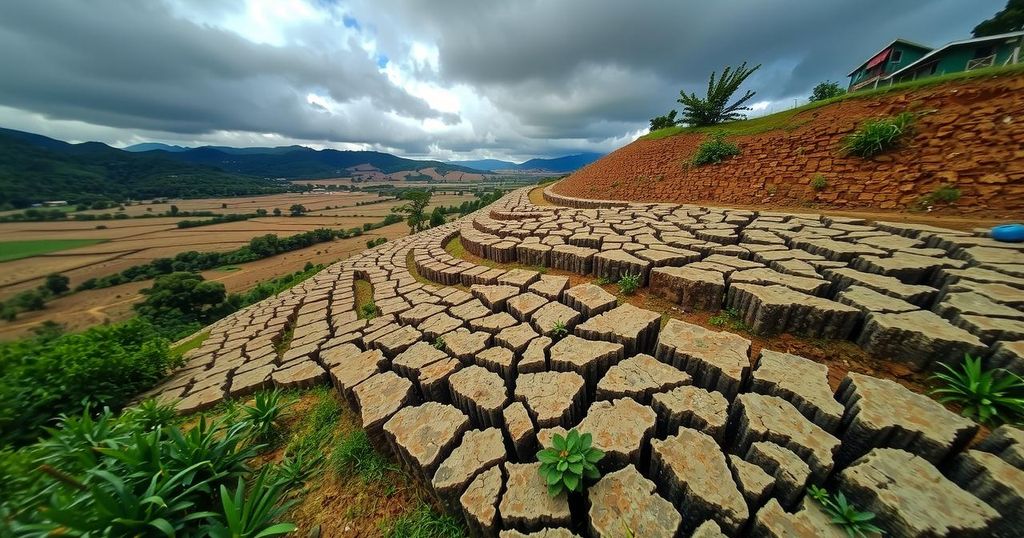Ecuador’s Drought Crisis: A Call for Global Responsibility and Local Resilience

Ecuador is facing its worst drought in 60 years, worsened by widespread wildfires threatening biodiversity. Climate change, mismanagement, and intentional fires are contributing to the crisis, impacting water and energy resources. The government has implemented electricity rationing amidst heavy economic losses, revealing a need for accountability from industrialized nations to address climate change effects.
Ecuador, a small but highly biodiverse nation in Latin America, is currently grappling with its most severe drought in 60 years, compounded by widespread wildfires that jeopardize its rich ecosystems. The country’s unique microclimates across its four regions result in significant variability in weather patterns, making agricultural planning and resource management challenging. The current dry season, particularly severe in the Andes Mountains where the capital city, Quito, is located, has been exacerbated by climate change and environmental mismanagement. Local authorities have been quick to label many of the forest fires as intentional acts, with Quito’s Mayor Pabel Muñoz deeming them “criminal and terrorist.” This perspective resonates with the sentiments expressed by local students, such as Alejandra Baca, a third-year international student. “It is very obvious that the forest fires were set, so you know it’s by people who want to create worse conditions for Ecuadorians and citizens of Quito specifically,” she stated, highlighting the emotional toll on individuals separated from their homeland amidst the crisis. Others, like Felipe Rivadeneira, a law student, criticize the government’s response, citing inadequate emergency management and insufficient fire protection services. With the ongoing drought, there is a concerning decline in rainfall that is impacting vital resources such as water reservoirs, agricultural outputs, and energy generation crucially reliant on hydropower, accounting for 70 percent of Ecuador’s domestic energy. Starting on September 18, the Ecuadorian government implemented electricity rationing to cope with the energy crisis, leading to widespread frustration as disruptions to electrical supply have severe impacts on daily life and economic activities. Rivadeneira noted, “Electricity effects drastically the quality of life for Ecuadorians, even more for the ones who depend on it to work.” The Ecuadorian Business Committee has calculated a staggering loss of over $12 million USD for every hour of electricity cuts, underscoring the urgency of the crisis. Janice Harvey, a professor of environment and society at St. Thomas University, pointed out that while immediate blame is often directed at current administrations, the systemic issues of climate change and ecological degradation trace back to global influences. Harvey emphasized that Ecuador, contributing minimally to the overarching global climate crisis, lacks the economic resources to effectively counteract these far-reaching effects, calling for accountability from industrialized nations historically responsible for fossil fuel emissions and the resulting climate shifts. In her analysis, she remarked, “It’s a chronic problem of not connecting the dots,” advocating for an integrative understanding of the complexities linking droughts, water shortages, and wildfires, and pushing for meaningful climate policies that address root causes rather than merely symptomatic responses. Ultimately, Ecuador’s plight underscores a broader need to reassess international responsibilities regarding climate change adaptation and mitigation strategies on a global scale.
Ecuador is renowned for its diverse ecosystems and microclimates, crucial for its agriculture and biodiversity. However, its geographical characteristics pose challenges in terms of consistent weather patterns and resource management. The recent drought, exacerbated by climate change, has highlighted these vulnerabilities, provoking significant social and environmental concerns among the population, especially after extensive forest fires have occurred. The economic ramifications of these environmental crises are severe, given Ecuador’s heavy reliance on hydropower for energy production.
Ecuador’s current drought and wildfire crisis reflect the severe challenges posed by climate change and environmental mismanagement. The nation grapples with immediate economic losses and the long-term ramifications of ecological degradation fueled by both local actions and global climate dynamics. There is a critical need for cohesive strategies that address the root causes of these environmental crises, with accountability from wealthier industrialized nations essential for fostering sustainable solutions. The voices of young Ecuadorians underscore the urgency of addressing these interconnected issues, as they seek comprehensive and effective responses that safeguard their homeland’s future.
Original Source: theaquinian.net





